
International Journal of Evidence & Proof
Scope & Guideline
Exploring the Intersection of Law and Evidence.
Introduction
Aims and Scopes
- Legal Evidence Analysis:
The journal extensively covers the analysis and interpretation of legal evidence, including statutory and case law, providing insights into the complexities of evidence in various legal contexts. - Judicial Processes and Procedures:
It examines the role of judges, juries, and legal practitioners in the evidentiary process, highlighting best practices and challenges faced in courtroom settings. - Cross-Jurisdictional Studies:
The journal explores evidence law across different jurisdictions, facilitating a comparative understanding of how various legal systems address evidentiary challenges. - Impact of Technology on Evidence:
There is a significant focus on the implications of digital and electronic evidence in legal proceedings, addressing how technological advancements affect the collection, presentation, and evaluation of evidence. - Vulnerable Witnesses and Victims:
The journal addresses issues related to vulnerable witnesses and victims in the legal system, emphasizing their rights and the need for protective measures during trials.
Trending and Emerging
- Human Trafficking and Sexual Exploitation:
Recent publications highlight a growing concern for issues related to human trafficking and sexual exploitation, emphasizing the need for evidence-based approaches in legal proceedings involving vulnerable populations. - Digital and Electronic Evidence:
There is an increasing emphasis on the complexities of digital and electronic evidence, particularly in the context of cybercrime and cross-border legal issues, reflecting the rapid advancement of technology and its implications for the justice system. - Psychological Aspects of Evidence:
Research on the psychological dimensions of evidence, such as juror biases and the influence of 'rape myths,' is emerging as a significant theme, contributing to a deeper understanding of how psychological factors affect legal outcomes. - International and Comparative Evidence Law:
A marked increase in comparative studies of evidence law across different jurisdictions indicates a trend towards understanding global practices and their implications for local legal systems. - Vulnerable Witnesses and Legal Protections:
The journal is increasingly addressing the rights and protections of vulnerable witnesses, with a focus on innovative practices and reforms to ensure fair treatment in legal proceedings.
Declining or Waning
- Traditional Hearsay Rules:
Discussion on traditional hearsay rules has decreased, possibly due to a shift towards more contemporary issues surrounding digital evidence and the reliability of witness testimony. - General Theoretical Frameworks:
There appears to be a waning interest in generalized theoretical frameworks for understanding evidence, with more emphasis now on empirical studies and case-specific analyses. - Civil Liability Cases:
The exploration of civil liability in the context of evidence has diminished, as the journal increasingly concentrates on criminal law and the evidentiary standards within that domain. - Historical Perspectives on Evidence Law:
Research focusing on historical perspectives and the evolution of evidence law is less common, indicating a trend towards contemporary issues that resonate more with current legal challenges. - Basic Legal Definitions and Concepts:
There is a noticeable decline in publications dedicated to basic definitions and concepts of legal evidence, suggesting that the audience may now expect more sophisticated analyses and applications.
Similar Journals

CRIMINAL LAW JOURNAL
Illuminating the path of criminal law practice.CRIMINAL LAW JOURNAL, published by LAWBOOK CO LTD, serves as a critical resource for legal practitioners, scholars, and students in the field of criminal law. With a dedicated focus on advancing the understanding of legal principles, case law, and statutory developments, this journal provides insightful articles, case analyses, and commentary from leading experts. Although it does not currently offer Open Access options, its rigorous peer-review process ensures the publication of high-quality research pertinent to contemporary issues in criminal law. The journal aims to foster academic discourse and promote best practices within the legal community. By maintaining a strong commitment to legal scholarship and education, the CRIMINAL LAW JOURNAL stands as a prominent platform for disseminating vital knowledge that influences policy-making and legal reform.

JOURNAL OF FORENSIC SCIENCES
JOURNAL OF FORENSIC SCIENCES is a premier publication dedicated to advancing the field of forensic science through high-quality research and innovation. Published by Wiley, this journal has been a reliable source of cutting-edge findings since its inception in 1961, with a continued commitment to excellence expected through 2024. With an ISSN of 0022-1198 and an E-ISSN of 1556-4029, the journal covers critical aspects of forensic medicine, including genetics, pathology, and molecular biology. Notably, it holds a Q2 ranking in Pathology and Forensic Medicine, reflecting its high impact and relevance in the field. Researchers and professionals benefit from comprehensive access to groundbreaking studies and discussions that drive advancements in forensic methodologies and technologies. While not an open access journal, its impact factor and rigorous peer-review process ensure that every article contributes significantly to the body of forensic science knowledge. Whether you are a seasoned forensic expert or an aspiring student, the JOURNAL OF FORENSIC SCIENCES serves as an essential resource for cutting-edge research and discoveries.
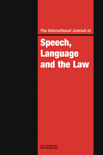
International Journal of Speech Language and the Law
Exploring the Nexus of Language and LawInternational Journal of Speech Language and the Law is a pioneering academic journal dedicated to the intersection of language, law, and forensic linguistics. Published by EQUINOX PUBLISHING LTD in the United Kingdom, this journal has been a vital resource since its inception in 1999, covering a broad spectrum of topics relevant to linguists, legal practitioners, and scholars alike. With an impact factor that reflects its growing importance—ranking Q3 in Law and Q2 in Linguistics and Language—this journal offers a forum for innovative research, case studies, and theoretical discussions. Researchers will find value in its accessible articles that challenge existing paradigms and provide insights into the use of language in legal contexts. Although it operates under a subscription model, the journal's contribution to the field is underscored by its Scopus rankings, making it a worthwhile consideration for anyone engaged in the study of how language affects legal processes. Engage with the journal's rich content to enhance your understanding and contribute to this scholarly dialogue.
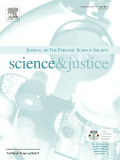
SCIENCE & JUSTICE
Unraveling Truth at the Intersection of Science and Law.Science & Justice is a leading international journal published by Elsevier Science Ltd, dedicated to the interdisciplinary examination of the intersection of justice and science, especially within the realms of forensic science and pathology. Established in 1995, this reputable journal has garnered a commendable Q2 rank in the category of Pathology and Forensic Medicine, reflecting its significant contributions to advancing knowledge in these critical fields. With an ISSN of 1355-0306 and an E-ISSN of 1876-4452, the journal is indexed in Scopus, positioning it in the top 68th percentile among its peers. The objectives of Science & Justice include promoting research that bridges scientific methodologies with justice-related applications, making it an invaluable resource for researchers, professionals, and students alike. As the journal continues to evolve, it aims to interface scientific innovations with forensic practices, thereby enhancing the integrity of justice processes globally. Despite not offering Open Access options, it remains a pivotal reference point within the academic community focused on forensic science methodologies and their legal implications.
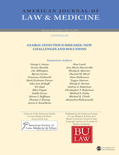
AMERICAN JOURNAL OF LAW & MEDICINE
Shaping the Future of Healthcare through Legal InsightAMERICAN JOURNAL OF LAW & MEDICINE is a prestigious interdisciplinary journal published by Cambridge University Press that bridges the critical intersection of legal and medical scholarship. Since its inception in 1975, this journal has fostered scholarly dialogue surrounding complex legal issues affecting health care and medical ethics, significantly contributing to the fields of law and the social sciences. With its current impact factor highlights showcasing a Q2 ranking in Law and Q3 in Health (Social Science), along with a solid readership base, the journal appeals to researchers, legal professionals, and students alike, offering a platform for impactful research and case studies. Although it does not currently provide Open Access options, the journal continues to prioritize rigorous peer-reviewed content, ensuring that essential discussions on law and medicine remain accessible to its readership. By engaging with contemporary legal and medical issues, the AMERICAN JOURNAL OF LAW & MEDICINE plays a vital role in advancing knowledge and shaping practices within these dynamic fields.

Revista General de Derecho Procesal
Fostering critical dialogue on legal procedures.Revista General de Derecho Procesal is a prominent scholarly journal published by IUSTEL based in Madrid, Spain. With its ISSN 1696-9642, this journal is dedicated to the field of procedural law, providing a dedicated platform for researchers, legal practitioners, and students to engage with contemporary issues and developments in legal processes. Though there is currently no impact factor listed, the Revista General de Derecho Procesal is recognized for fostering critical dialogue and advancing knowledge in procedural law, making it an essential resource for those studying or practicing in this discipline. The journal aims to publish peer-reviewed articles, case studies, and theoretical analyses that contribute to the understanding of legal procedures in various jurisdictions. This commitment to rigorous scholarship is underscored by its comprehensive approach to addressing both historical and modern challenges in the field. As an important academic outlet, the journal plays a vital role in shaping the discourse surrounding procedural law, appealing to a wide audience of legal scholars, professionals, and students alike.
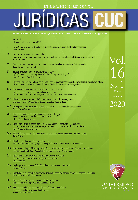
Juridicas CUC
Innovating Legal Research for Global ImpactJuridicas CUC, published by UNIV COSTA, is a distinguished open-access journal dedicated to the field of Law, prominent since 2011. With an ISSN of 1692-3030 and an E-ISSN of 2389-7716, this journal serves as a vital resource for researchers, professionals, and students in Colombia and beyond. It holds a commendable Q2 status in Law for 2023, and its Scopus ranking places it at #425 out of 1025 in Social Sciences _ Law, reflecting its commitment to high-quality scholarship, evident in its 58th percentile. The journal aims to foster academic dialogue by publishing innovative and impactful research, contributing to the advancement of legal studies in a global context. Located in Barranquilla, Colombia, Juridicas CUC is committed to enhancing accessibility to legal research, ensuring that scholars from various backgrounds can engage with contemporary legal issues effectively.

Jurnal Cita Hukum-Indonesian Law Journal
Pioneering Knowledge in Southeast Asian Legal Studies.Jurnal Cita Hukum-Indonesian Law Journal, with ISSN 2356-1440 and E-ISSN 2502-230X, is a prestigious open-access journal published by UNIV ISLAM NEGERI SYARIF HIDAYATULLAH JAKARTA. Since its inception in 2013, this journal has become a critical platform for the dissemination of legal scholarship in Indonesia, addressing crucial topics in Indonesian law and its applications within the broader Southeast Asian context. The journal's commitment to accessibility ensures that research findings are readily available to a wide audience, promoting knowledge-sharing among researchers, legal professionals, and students alike. As it continues to forge new avenues of inquiry in legal studies, Jurnal Cita Hukum plays a significant role in enhancing the understanding and development of law in Indonesia, making it an invaluable resource for those committed to advancing legal scholarship and practice.
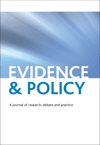
Evidence & Policy
Pioneering the Future of Evidence-Based PolicyEvidence & Policy is a leading academic journal published by Policy Press, focusing on the intersection of evidence-based research and public policy. With an ISSN of 1744-2648 and an E-ISSN of 1744-2656, this journal serves as a crucial platform for disseminating research across various fields, including Cardiology, Orthopedics, Sports Medicine, and Social Sciences. Notably recognized in the 2023 category quartiles as Q2 in several pivotal health categories and Q1 in Social Sciences (miscellaneous), it demonstrates significant impact and reach within the academic community, evidenced by its SCOPUS rank of 73/604 in Social Sciences, placing it in the 87th percentile. Although not open access, the journal plays an essential role in fostering dialogue between researchers, policymakers, and practitioners, contributing to informed decision-making processes grounded in robust evidence. Whether you are a researcher aiming to publish groundbreaking studies or a professional seeking to stay informed on the latest policy debates, Evidence & Policy remains an indispensable resource.

Revista Juridica Portucalense
Empowering Research in Law and Political StudiesRevista Juridica Portucalense, published by the Universidade Portucalense Infante D Henrique Cooperativa de Ensino Superior in Portugal, stands as an influential peer-reviewed journal focusing on the fields of Law, Political Science, and Sociology. With an ISSN of 2183-5799 and an E-ISSN of 2183-5705, this Open Access journal has made significant strides in promoting scholarly research and academic discourse since its launch in 2014. The journal is categorized in the Q3 quartile for 2023 across its respective disciplines, highlighting its growing impact within the academic community, despite its current H-index rating still being unestablished. With a Scopus ranking pointing to its dedication to quality scholarship—ranked #724/1025 in Law and maintaining a presence in Political Science and Sociology—Revista Juridica Portucalense is an indispensable resource for researchers, practitioners, and students alike who are eager to engage with contemporary legal issues and the interplay of political and social dynamics.